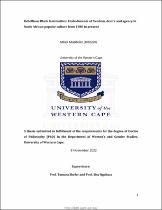| dc.contributor.advisor | Shefer, Tamara | |
| dc.contributor.author | Mazibuko, Mbali | |
| dc.date.accessioned | 2023-05-09T11:37:07Z | |
| dc.date.available | 2023-05-09T11:37:07Z | |
| dc.date.issued | 2022 | |
| dc.identifier.uri | http://hdl.handle.net/11394/9863 | |
| dc.description | Philosophiae Doctor - PhD | en_US |
| dc.description.abstract | In this thesis, I explore the notion of rebellious Black femininities and how they are articulated through and within popular culture in South Africa. I focus on the biographies of some women who have occupied the South African public imaginary over the last few decades, including the late apartheid and post-apartheid eras. The focus is specifically on Brenda Fassie as she emerges in the entertainment industry in 1980s apartheid South Africa, Boom Shaka and Lebo Mathosa during the transition to democracy and in the early democratic state, contemporary women like Khanyi Mbau, and the figure of the Slay Queen. I show how rebellious women are not simply oppositional to socially constructed notions of ‘good’ or ‘traditional’ femininities. Rather, through the biographies of the aforementioned Black women, I demonstrate that femininities that complicate binarisms are rebellious because they destabilise hegemonic gendered and intersecting social constructions. | en_US |
| dc.language.iso | en | en_US |
| dc.publisher | University of the Western Cape | en_US |
| dc.subject | Erotic | en_US |
| dc.subject | Social Construction | en_US |
| dc.subject | Femininities | en_US |
| dc.subject | Rebellious | en_US |
| dc.title | Rebellious Black femininities: Embodiments of freedom, desire and agency in South African popular culture from 1980 to present | en_US |
| dc.rights.holder | University of the Western Cape | en_US |

